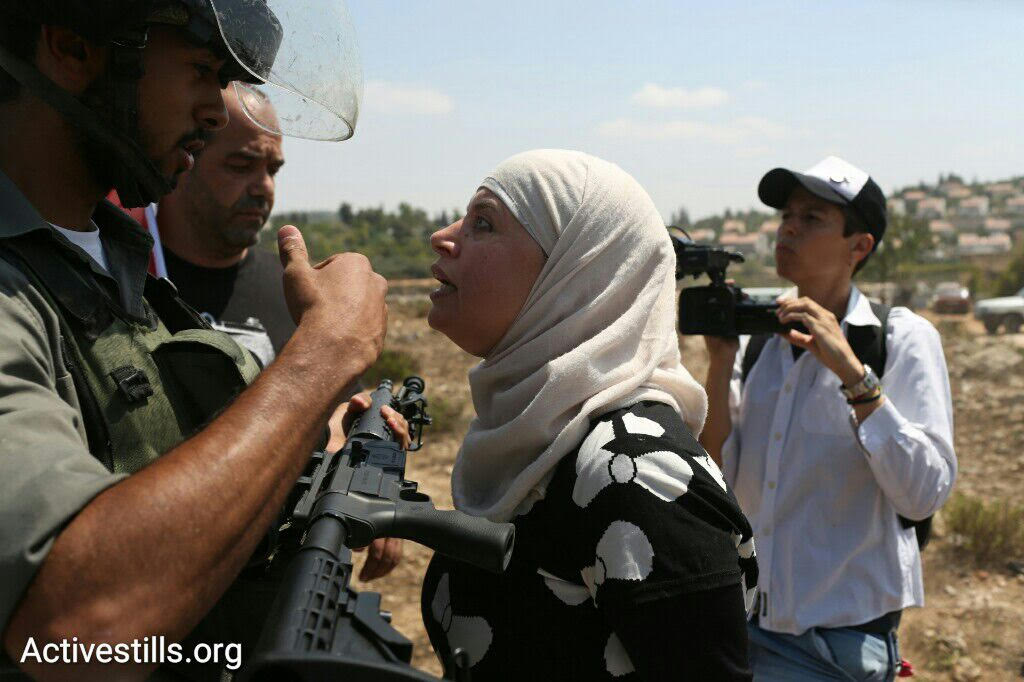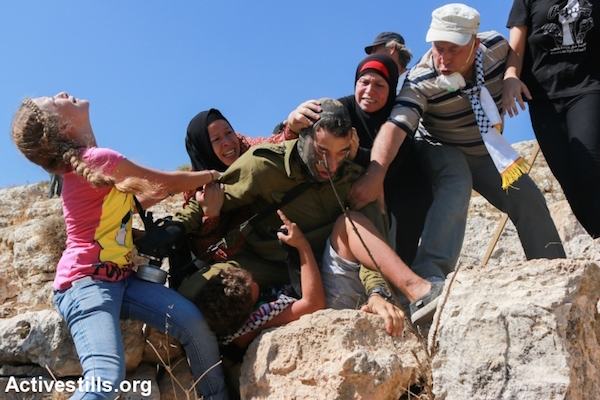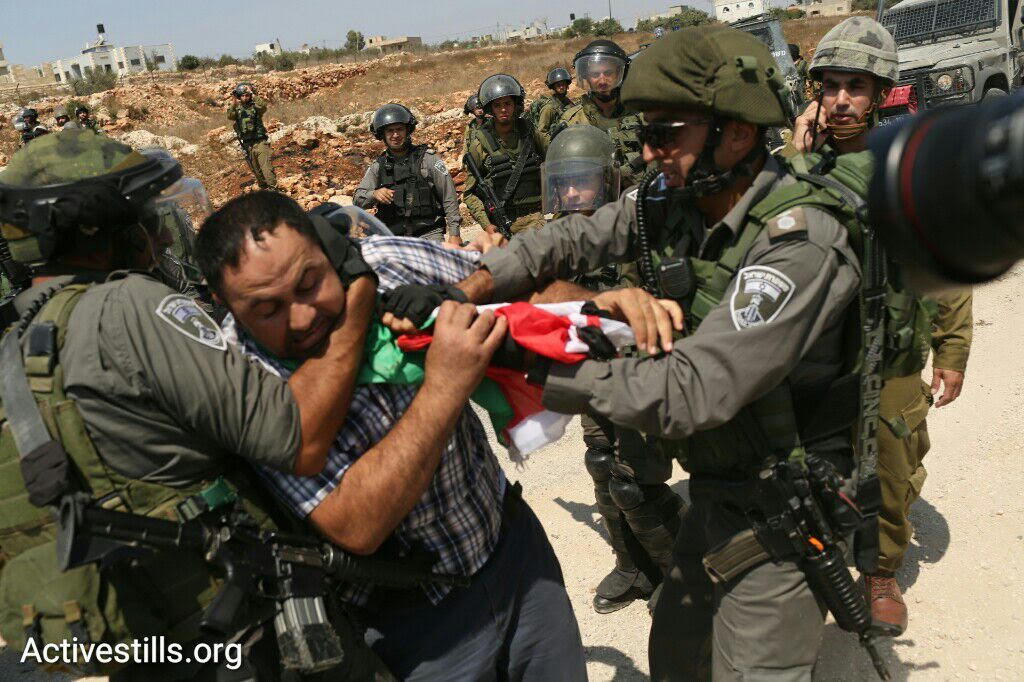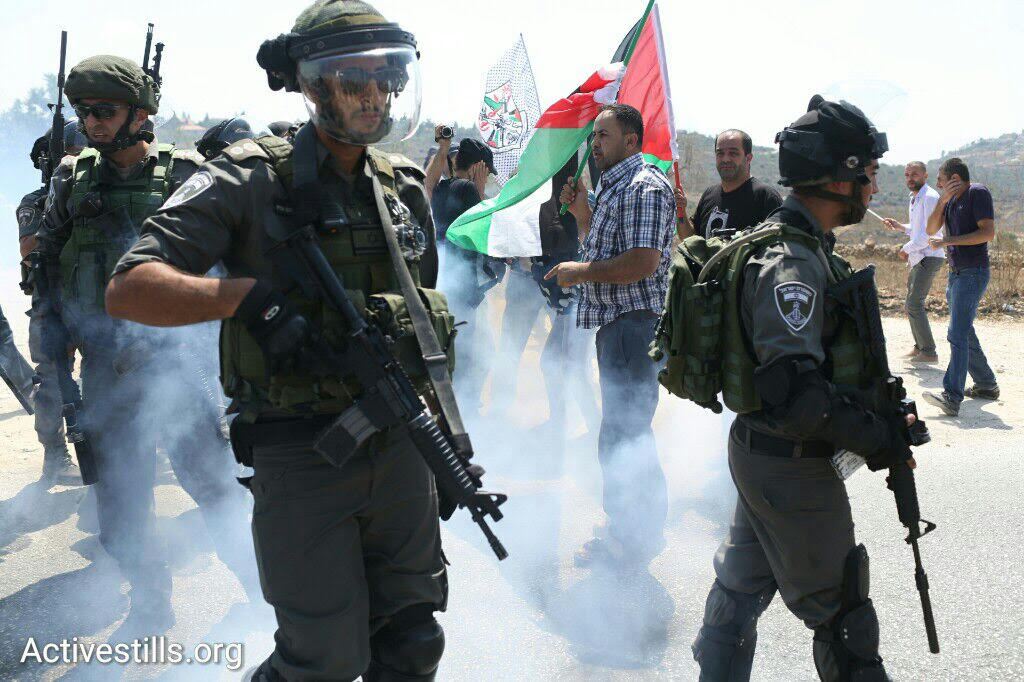The residents of the small West Bank village, who were recently propelled into the international spotlight, know that neither slingshots nor sophisticated camera angles are their best weapon against military rule.

Many Israelis never heard of Nabi Saleh before a video of a soldier struggling with a child and his women family members went viral.
It wasn’t just the violence of a soldier’s overwhelming might rushing the delicate body of an injured kid that made the video upsetting. There was something horrible about seeing a grown man lose his armed-to-the-teeth cool to a mere child, struggling and cursing as if fighting for his life. He had lost control, not only of the situation, but of himself.
The women who harangued him caused no physical damage. But his soul and his distorted mouth, pulled wide by the women’s fingers, looked tormented.
Military injuries — a bullet or even a rock — can look heroic in popular imagination. Having one’s mouth pried open and the fingers of your enemy stuck inside robs the soldier even of his heroism. The pain of this video for Israelis is that he looks wrecked, violated — humiliated.

The political background to Nabi Saleh’s demonstrations is simple. The villagers are protesting against the settlement of Halamish, across from the village on a neighboring hill, and specifically for the spring that lies between the two communities. Every Friday since 2009, residents of Nabi Saleh march down the road leading out of the village to reach the spring; at the end of the road, the IDF waits to block their exit.
The barricade is a line of Border Policemen bulky with visor helmets, vests, automatic weapons and buzzing communications equipment. They try to disperse the protests with stun grenades, tear gas, rubber and occasionally live bullets and in previous years, tank trucks spewing miasmic “skunk” water. The demonstrators bring flags and chants, and the shabab: the teenage boys or young men hovering on the rocky slopes above the road with stones ready.
This week, right wingers held a demonstration in support of the soldier in the video. A small group gathered at the bottom of the road from Halamish and marched to the spring. Nobody stopped them.
Read: In Nabi Saleh, an occupier’s sense of entitlement
Despite the simple issues, when last week’s video surfaced, the Israeli press almost completely avoided the political background of the story. One television anchor explained that Palestinians provoke soldiers, then chase after the resulting scene with cameras. It was, she said, their regular tactic in the battle of consciousness. Or narratives. Or images. I don’t remember the exact word, because they are used interchangeably here. Whichever it was, she and her audiences know which word silently precedes those terms: false consciousness. False narratives. False images.
And it’s true that Nabi Saleh’s suffering seems marginal relative to three wars in Gaza and a decade of rockets in Israel; the issue is wan compared to the political imbroglio of the Palestinian leadership or the geostrategic nature of the Israeli-Palestinian conflict. But for these villagers, the battle is their community, their mission. The demonstrators of Nabi Saleh have something not often seen in the headlines: confidence.

After the video, there was a sense of expectation as the small cluster of demonstrators gathered again this week. Would the army crack down? Or would it try to pace these hasbara fiascos and keep things controlled?
Under the scorching white midday sun, all players take up their positions. Some press and demonstrators wear gasmasks and protective gear. The marchers, almost outnumbered by photographers, stalk down the road and up to the line of soldiers, chanting: “Occupation will fall!” and “One, two, three, four, occupation no more! Five, six, seven, eight, Israel is apartheid state!” A stream of Palestinian flags ripple like sails in front of the soldiers.
Behind the barricade stand three jeeps sporting Israeli flags. A loudspeaker proclaims: “This is a closed military zone. This demonstration is illegal.”
The crowd breaks out into a great whooping cheer, laughing and clapping in derision. Right at the start, stun grenades go off with yellow flashes and a deafening bang. People run reflexively, then return towards the front. Deeply noise sensitive, I clap my hands over my ears and run too, then wheel around and come back like the others. But as the grenades go on, the surprise wears off. People stop running unless something new happens.
The soldiers and demonstrators are now standing centimeters apart, so close that when a scuffle breaks out and the photographers close in, no one knows what is happening inside.
But in between arms and guns and zoom lenses, in those few centimeters what I see is a battle of nerves. Women from Nabi Saleh are wagging their fingers and lecturing the soldiers at point blank range. Flags are brushing their helmets.
The soldiers stare ahead, looking desperate to avoid eye contact. Some turn on the photographers instead, who are mostly Israeli. They use their weapons as batons to push them back and say in commanding tones, in Hebrew: “Move it back!” But it’s not the photographers who are resisting. When asked to move, they do.
The impotence, the craving for small victories even if they aren’t real ones, is mounting. A soldier loses patience and angrily grabs a Palestinian flag out someone’s hand. He crumples it up into a ball.
“Give it back!” a woman shouts. He walks away.
The slow-motion tug between the soldiers and demonstrators continues under the pounding sun. There is neither tear gas nor stones. The loudspeaker blares in Arabic again: “Captain Yousef says! You are all in a closed military zone. Go away – now!” A demonstrator and a soldier push each other, and there is another symphony of shutter clicks. The Palestinians keep jeering, laughing, taunting.
WATCH: Palestinian family prevent arrest of minor in Nabi Saleh
And suddenly the slow dance is shattered by the lighting movement of a soldier. His arm lashes out and people draw back. The man has the enraged motions as the soldier in the video. And it could be someone’s throat but he lunges instead for the thing he can no longer stand, the thing that mocks him in this miserable heat. It is the flag. He rips it out of a protestor’s hands and wheels away from the crowd. With a stick – perhaps the one that dangled those colors over his nose a few seconds ago – he drags it through the dust on the side of the road, poking and shaking it away from him like a cockroach from the sewer.
Ripples rise in the crowd. All those weapons waiting to be discharged.
But today is not the day. Instead, the demo pulls back. The teenagers let a few stones fly, followed by random rubber bullets. The observers trot back up the road to avoid them.
Now people retreat to a tent that has been set up with plastic chairs; the villagers banter and wisecrack as they watch the hillside like a spectator sport. Tear gas and stones are fired in the distance, but it’s clearly over. Still, three armored jeeps suddenly charge dramatically up the road as if preparing to enter the village. They retreat just minutes later, rocks following them.

“They just had to have one final word,” someone says.
And it’s true. The jeeps were a replay of last week, when the soldier, after being extracted by his buddies, threw a pointless stun grenade at the women who had harassed him. And both are the same as the soldier who went to battle with a cheap piece of colored nylon, half an hour earlier.
It dawned on me: the weapon of Nabi Saleh is neither slingshots nor sophisticated camera angles. It is humiliation. The demonstrators taunt in complete conviction that they are right, and knowing that whatever the soldiers do in their rage will never be viewed as right. And the soldiers aren’t allowed to do those things anyway. Instead, Israel’s vaunted heroes are reduced to battling an injured 12-year-old. The soldier this week fought against a cheap scrap of nylon.
The Israeli media can’t cover Nabi Saleh in its entirety because nobody can handle humiliation. It doesn’t make mothers proud. And Israel prefers to dismiss non-violent opposition to the occupation such as UN and ICC strategies, or boycott efforts, as anti-Semitic, while humiliation is immune to those charges. But whether viewed on the news or not, humiliation can destroy human beings.



